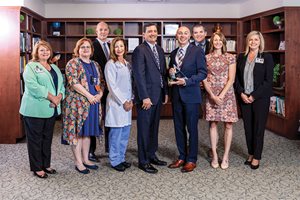Hereditary Cancer Risk Assessment Earns Best Practice Award
 Licking Memorial Health Systems (LMHS) was awarded the Ohio Patient Safety Institute (OPSI) Ambulatory Best Practice Award for offering hereditary cancer risk assessment and genetic counseling to the community. The award recognizes the program that has best incorporated regional and national patient safety benchmarks, demonstrated a clear focus on improving patient safety in a healthcare setting, and is innovative and unique to the Ohio healthcare market. LMHS earned the award for designing and implementing the most innovative evidence-based patient safety practice in the state.
Licking Memorial Health Systems (LMHS) was awarded the Ohio Patient Safety Institute (OPSI) Ambulatory Best Practice Award for offering hereditary cancer risk assessment and genetic counseling to the community. The award recognizes the program that has best incorporated regional and national patient safety benchmarks, demonstrated a clear focus on improving patient safety in a healthcare setting, and is innovative and unique to the Ohio healthcare market. LMHS earned the award for designing and implementing the most innovative evidence-based patient safety practice in the state.
Founded by the Ohio Hospital Association (OHA), the Ohio State Medical Association, and the Ohio Osteopathic Association, OPSI works with hospitals and healthcare workers to improve healthcare outcomes in Ohio. OHA Vice President Quality Programs James Guliano, M.S.N., and OHA Director of Clinical Support Services Kelsey Brown visited with LMHS leadership to present the award. LMHS also received recognition at OHA’s 2022 Annual Meeting Recognition Dinner on June 14.
“Hereditary cancer research has many benefits for patient safety, including identifying high risk patients to offer early screenings,” said Rob Montagnese, LMHS President & CEO. “Although only 10 percent of cancer cases are considered hereditary, these types of cancers can be more deadly. The Laboratory Services leadership recognized the need to be more proactive in the fight to prevent cancer by utilizing genetic testing.”
“We were extremely impressed with the LMHS hereditary cancer risk assessment and genetic counseling program,” said James during his visit. “It is extremely unusual to have such a program at a community hospital.”
As part of the program, LMHS employs a Genetics Navigator to work with providers to identify patients who would benefit from genetic testing. Susan Fantini, M.S., M.T., CGRA, works to educate patients and staff about the hereditary cancer risk assessment program. The goal is to recognize patients in the general population who have genetic mutations that place them at an increased risk for developing cancers, such as breast, ovarian, colorectal, or melanoma. Early identification of such mutations allows LMHS to identify patients who will most benefit from early screenings to detect cancer in the earliest stages when it is most treatable.
LMHS Oncology patients also benefit from genetic testing. The results can assist in choosing the best possible treatment. According to the basic population statistics, 30 percent of LMHS patients will meet criteria for genetic testing and slightly fewer will undergo such testing. To screen patients, LMHS staff members offer a risk assessment questionnaire for the patient to complete. A healthcare provider then discusses the risk factors discovered in the assessment. The patient is then offered genetic testing if appropriate or indicated.
Once a patient is identified as “atrisk” through the utilization of the risk assessment form, the healthcare provider directs the patient to Susan for further questions and discussion. Susan then sends a completed test request form, a three generation pedigree, and chart notes back to the providers office which creates a simple process for test submission. All data and results are maintained within the electronic medical record for review by the patient and their care team.
In November 2020, LMHS began offering an at-home genetic counseling call to every patient initially recognized through the risk assessment form as at an elevated risk. Since implementing the at-home call, the percentage of patients receiving genetic testing has increased from below 20 percent to over 30 percent, and 90 percent of patients who receive the counseling call participate in the testing. The free genetic counseling is provided by a reference laboratory at no charge to LMHS or the patient. Because calling from home was successful throughout the pandemic and patients have reported preferring this method, LMHS has decided to continue with the at-home calls.
“It is a simple process, and with the results, we can focus on prevention. We can provide our patients with more information about the type of cancers they could face and help them make the best choice for their care,” Rob said. “We do not want to frighten anyone. We just want to equip patients with the knowledge to make the best choices for themselves in order to decrease their cancer risk.”
The decision to have the counseling session by phone while the patient is at home has assisted in more robust, detailed family history being reported. The patient can now consult with other family members while discussing the risk assessment and is more at ease about sharing certain topics. In a physician office or hospital setting, many patients often felt too anxious and overwhelmed by the amount of information, and often reported not being able to recall all of the topics discussed with the provider. When the patients had the opportunity to contact family and discuss past events before the counseling call, they reported feeling better prepared and able to provide a more accurate history.
Genetic testing may be appropriate for individuals with the following characteristics:
- Family members who had a cancer diagnosis at an unusually young age
- Personal history of multiple types of cancer
- Several close blood relatives with the same type of cancer
- Being a member of a racial/ ethnic group that is known to be associated with genetically inherited cancers